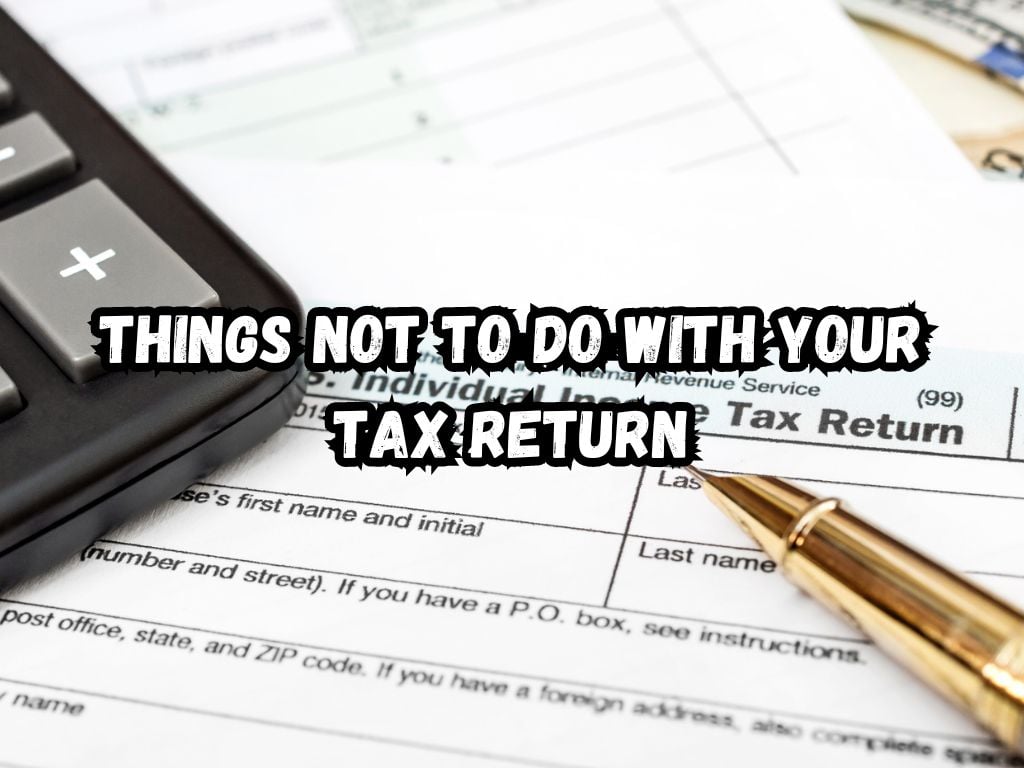Tax season is a time filled with paperwork and deadlines, but for many, it also means the arrival of a tax refund. This sudden influx of money can feel like a windfall.
However, without a plan, it’s easy to misuse these funds. To ensure your tax refund works for you, avoid these pitfalls.
Things Not To Do With Your Tax Refund
Overspending on Unnecessary Luxuries
The impulse to treat yourself after receiving a tax refund is natural. You might feel entitled to reward yourself for a year of hard work.
Resist the urge to spend lavishly on items that offer no refund on investment. Spending on luxuries can deplete funds that could otherwise bolster your financial footing.
Allocate a small part of your tax refund to enjoy. Set a clear budget for any treats. This way, you can satisfy the urge to splurge without derailing your financial plans.

Ignoring Debt and Loans
Debt can weigh heavily on your finances. If you have outstanding debts, especially those with high interest, they should be your priority. Using your tax refund to reduce, or clear, these debts can relieve financial stress.
By paying off high-interest loans, you save money on future interest. For instance, credit card debt often comes with steep interest rates.
Paying this down can improve your financial landscape. Remember, the less debt you have, the more freedom you have with your finances.
Not Saving or Investing
It may not be as exciting as spending, but saving your tax refund can provide immense future benefits. Emergencies happen, and having funds set aside can help weather unexpected costs without plunging into debt.
Consider different saving options. An emergency fund offers easy access to your money if needed. For long-term goals, investment accounts like IRAs or mutual funds might be more suitable. Saving even a small portion of your tax refund can lead to significant growth over time due to the power of compound interest.
Forgetting to Fund Retirement Accounts
Planning for retirement is crucial. If you’ve neglected your retirement funds, use your tax refund to catch up. Contributing to these accounts not only secures your future but may also provide current tax benefits.
Make additional contributions to your IRA, 401(k), or another retirement plan. Over the years, these contributions grow. By the time you retire, these savings can make a considerable difference in your quality of life.
Engaging in Risky Investments
Investments can be a great way to grow your money. However, it’s essential to approach them with caution. High-risk opportunities that promise substantial refunds in a short period are particularly tempting when you have extra cash.
Rather than jumping into risky ventures, take the time to do thorough research or speak with a financial advisor. Understanding the risks and having a clear investment strategy can help protect your funds.
Neglecting Insurance Needs
Insurance is an essential part of financial planning. It safeguards against unforeseen disasters that could otherwise ruin your finances. Whether it’s health, home, auto, or life insurance, make sure your coverages are adequate.
Use a portion of your tax refund to fill any gaps in your insurance. For example, if you’ve recently had a child, it might be time to look into life insurance. Keeping your policies up-to-date can offer peace of mind and prevent monetary losses in the future.
Loaning Money to Friends or Family
Lending money to loved ones is fraught with potential problems. It can strain or even break relationships if the borrower fails to repay the loan. Treat loans to friends or family as gifts, so if repayment issues arise, it doesn’t lead to bitterness.
If you decide on lending, be clear about the terms. Discuss repayment plans and expectations. But remember, it’s also okay to say no. Your financial security should come first.
Not Consulting with a Tax Professional
Tax laws are complex, and changes occur often. A tax professional can provide guidance on how to make the most of your money.
Invest in a tax professional’s services to explore beneficial uses for your tax refund. They might identify additional deductions or credits or suggest strategies for investing or saving. Even though it costs, professional advice can lead to better financial decisions.

Frequently Asked Questions
Should I spend my tax refund on home improvements?
Home improvements can increase your property’s value. But prioritize according to necessity and potential refund on investment.
How much of my tax event should I save?
There is no one-size-fits-all answer. However, aiming to save at least 20-30% of your tax refund can provide a solid foundation for financial emergencies or future investments.
Is it a good idea to use my tax refund to buy stocks?
Investing in stocks can be a part success of your financial plan. But, ensure it aligns with your risk tolerance and investment goals.
Can I use my tax refund to pay off student loans?
Using your tax refund to pay off student loans is often a smart decision. It can reduce your overall interest paid and lead to being debt-free sooner.
What are some smart ways to invest my tax refund?
Smart investments might include retirement accounts, an emergency fund, stocks and bonds, or real estate, depending on your financial goals.
How can a tax professional help me decide what to do with my tax refund?
A tax professional can advise on maximizing tax benefits, suggest investment strategies, and help create a plan for your tax refund that aligns with your financial objectives.
Conclusion
Receiving a tax refund is an opportunity. By avoiding the common mistakes outlined here—overindulging, ignoring debt and loans, not saving or investing, neglecting retirement savings, pursuing risky investments, overlooking insurance needs, making ill-advised loans, and foregoing professional tax advice—you’ll be better prepared to make wise financial choices.
Approach your tax refund with a plan, and your future self will thank you.


 Tags:
Tags:










